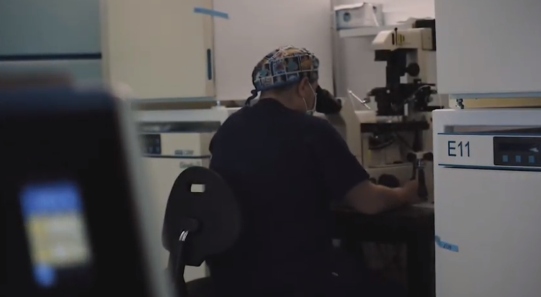
Assisted reproduction
Pre-implantation Genetic Diagnosis (PGD)
PGT (Pre-implantation Genetic Testing) or PGD (Pre-implantation Genetic Diagnosis) involves primary prevention methods which enable us to anticipate the detection of genetic anomalies, in both the chromosomes (PGT-A, PGT-SR) and genes (PGT-M) of embryos, thus facilitating the selection of viable embryos for transfer to the uterus.
The objective of Pre-implantation Genetic Diagnosis (PGD)
The objective of PGD is to increase the chance that babies will be born healthy, with no chromosomal syndromes or hereditary diseases, using high tech equipment on each of the embryos which were previously obtained via IVF.

What does PGT/PGD consist of?
The technique consists of extracting a small number of cells (2-7) from each embryo which was able to develop to the stage of an expanded blastocyst, a state which isreached on day 5-6 of embryonic development. Once the biopsy has been carried out, the embryo is then frozen, awaiting the results from the genetics laboratory.
The cells obtained in the biopsy are analysed to check whether the embryo is
carrying any type of chromosomal or genetic anomaly. This allows us to select only those which are viable for subsequent transfer to the patient’s uterus.
PGD can put many couples undergoing assisted reproduction treatments at ease as it avoids many cases of miscarriage and it increases the chances of having a healthy baby by avoiding the transmission of certain diseases.
When is Pre-implantation Genetic Diagnosis (PGD) the right technique to use?
There are various situations in which PGD can be used and they are not always related to a family illness which is caused by detected and defined genetic anomalies, an abnormal parental karyotype, a medical history of miscarriages caused by chromosomal disorder, etc.
In general terms, PGD is used in the following cases:
- Patients who have been diagnosed with chromosomal anomalies which may be transmitted to their descendents.
- In cases of more advanced maternal age, i.e. women over 35.
- Women who have suffered recurrent miscarriage.
- Couples with prior embryo implantation failure in two or more IVF cycles.
Are PGT/PGD results reliable?
The certainty of results is very high but it must be born in mind that, like in all biological techniques, they are not 100% reliable. To start with, given that only a
small amount of biological material is available, there is a risk that when a single cell is taken it will not be representative, for example if mosaicism (when there are
various genetic lines with distinct genetic information within the same organism) has occurred. However, as the risk of this is low, the results of that cell can be considered valid in 95% of cases.









